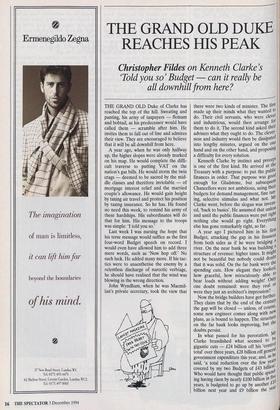THE GRAND OLD DUKE REACHES HIS PEAK
Christopher Fildes on Kenneth Clarke 's
'Told you so' Budget — can it really be all downhill from here?
THE GRAND OLD Duke of Clarke has reached the top of the hill. Sweating and panting, his army of taxpayers — flotsam and bobtail, as his predecessor would have called them — scramble after him. He invites them to fall out of line and admires their view. They are encouraged to believe that it will be all downhill from here.
A year ago, when he was only halfway up, the higher slopes were already marked on his map. He would complete the diffi- cult traverse to putting VAT on the nation's gas bills. He would storm the twin crags — deemed to be sacred by the mid- dle classes and therefore inviolable — of mortgage interest relief and the married couple's allowance. He would gain height by taxing air travel and protect his position by taxing insurance. So he has. He found no need this week, to remind his army of these hardships. His subordinates will do that for him. His message to the troops was simple: 'I told you so.'
Last week I was nursing the hope that his terse message would suffice as the first four-word Budget speech on record. I would even have allowed him to add three mere words, such as 'Now hop off.' No such luck. He added many more. If his tac- tics were to anaesthetise the enemy by a relentless discharge of narcotic verbiage, he should have realised that the wind was blowing in the wrong direction.
John Wyndham, when he was Macmil- lan's private secretary, took the view that
there were two kinds of minister. The first made up their minds what they wanted to do. Their civil servants, who were clever and industrious, would then arrange Or them to do it. The second kind asked their advisers what they ought to do. The clever- ness and industry would then be dissipated into lengthy minutes, argued on the one hand and on the other hand, and proposing a difficulty for every solution. Kenneth Clarke by instinct and precept is one of the first kind. He arrived at the Treasury with a purpose: to put the public finances in order. That purpose was good enough for Gladstone, but subsequent Chancellors were not ambitious, using their budgets for demand management, fine tun' ing, selective stimulus and what not. Mr Clarke went, before the slogan was invent' ed, 'back to basics'. He assumed that unless and until the public finances were put right nothing else would go right. Everything else has gone remarkably right, so far. A year ago I pictured him in his first Budget, attacking the gap in his finances from both sides as if he were bridging a river. On the near bank he was building a structure of revenue: higher taxes. It might not be beautiful but nobody could doubt that it was solid. On the far bank were the spending cuts. How elegant they looked, how graceful, how miraculously able t° bear loads without adding weight! OnlY one doubt remained: were they real or were they just an architect's impression? Now the bridge builders have got further. They claim that by the end of the centurY the gap will be closed — unless, of course, some new engineer comes along with nevi plans, as is bound to happen. The structure on the far bank looks improving, but the doubts persist. In what passed for his peroration, Mr Clarke brandished what seemed to be gigantic cuts — £24 billion off his 'cont total' over three years, £28 billion off genet- government expenditure this year, and, as ile said, 'a total reduction over the few Yeal covered by my two Budgets of £43 billion,: Who would have thought that public spenue ing having risen by nearly £100 billion in U10 years, is budgeted to go up by another billion next year and £9 billion the Y0' after? Who would have suspected that this Year's big cut — a nice round E4 billion — comes out of the contingency reserve? After all these efforts, he now expects to have to borrow £341/2 billion this year, f211/2 billion next year and L13 billion the year after. The direction is right but the num- bers still do not leave him sitting on a pile of cash, all set to dispense bounty in elec- torally deserving quarters. No wonder his predecessor was saying at the weekend, in his inimitable style, that the increase on VAT was essential if the Conservatives were to stick to their policy of cutting taxes.
The heaviest charge on the public finances is welfare. It puts on weight in a re-cession without shedding it in a recovery. Mr Clarke is now budgeting for it to put on another f121/2 billion in a few years. Much of his budget speech was directed to appeas- ing it and getting it to behave better. He wants to make it harder for landlords and tenants to agree to higher cuts, send the bill to him and (if they feel like it) split the proceeds He announced the usual crackdown on social security fraud, as much a part of the Budget ritual as the closing of the tax loopholes. He put effort into altering the system at the margin, to loosen the jaws of the poverty trap and make work more worthwhile. Under the hew rules, the more work you do, the more Family Credit you can get. We could do With more benefits like that. Better still, we could do with fewer ben- efits. Their complexity is now prodigious. As the Chancellor ploughed his way through the list (Workstart, work trials, job seekers' allowance, job finders' grants, job match), I reflected that I could not cope with them without the help of an accoun- tant. Stand by for an accountancy grant, Which (as a by-product) would reduce unemployment within this productive profession.
Some government is going to have to tame the welfare jungle and to cut it back. Some Chancellor is going to have to take his machete to the taxation of savings, that overgrown tangle of incentives and allowances and penalties. Pressed this year ?2) bring back investment allowances as incentives to companies, Mr Clarke refused. They made for bad decisions, he said. He would rather have low rates of tax than high allowances. Having stated this admirable principle, Mr Clarke stops short of applying it to sav- ings. Politically too difficult, we are told. If Political difficulties always stopped this Chancellor, the public finances would still be in the mess where he found them. His Budget signalled one distinct change for the worse. A new law will allow compa- mcs in trouble to declare a 28-day stand- still with their creditors. It is amazing how such companies' assets can melt away in 24 hours, let alone 28 days. If Mr Clarke wanted to discourage lending to business, he has gone the right way about it. This legislation should be called the Robert Maxwell (Give Him 28 Days' Start) Bill.
There was a change for the better, too, signalled before Mr Clarke stood up. I was arguing last week for a one-clause Compa- nies Bill which would make directors' con- tracts (fat or thin) subject to affirmative resolution by shareholders in general meeting. A Spectator-reading backbencher put their argument to the Prime Minister — why, he asked should shareholders be left to read about these contracts in their morning papers, after the event? 'It is our ingenious suggestion,' the Prime Minister said, 'which I am happy to consider.' As Kenneth Clarke would say, I told you so.











































































 Previous page
Previous page